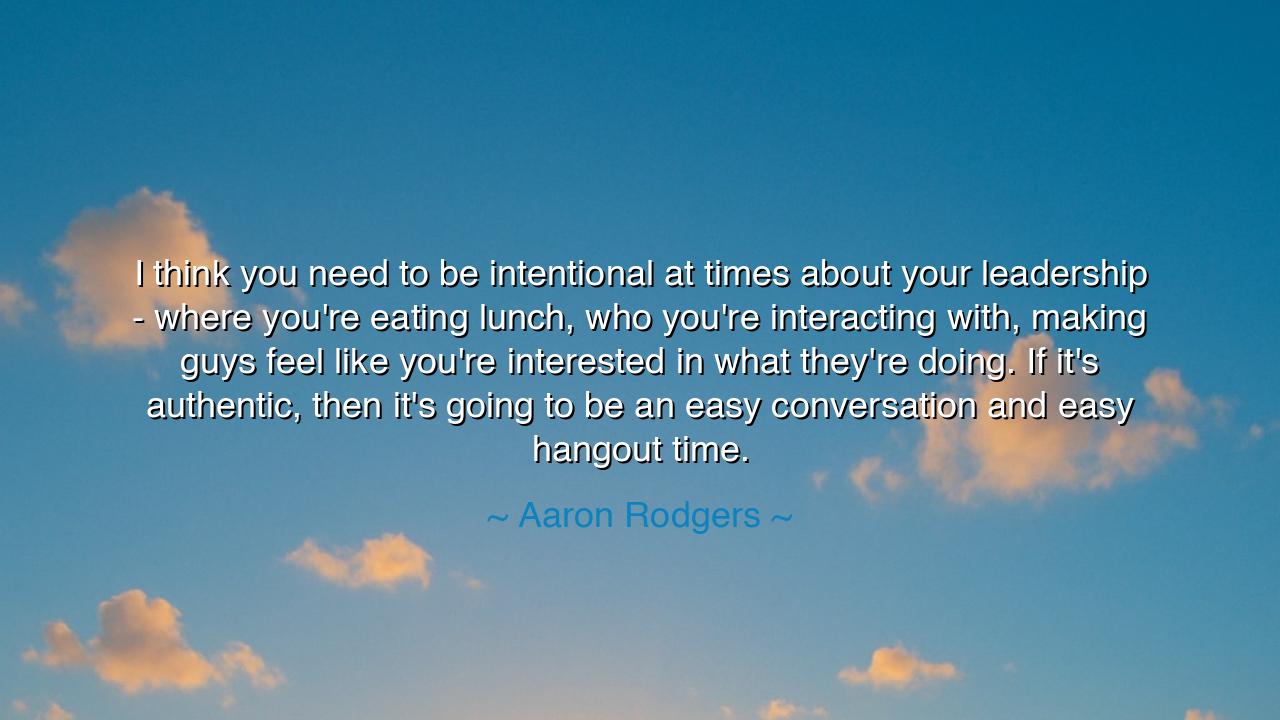
I think you need to be intentional at times about your leadership
I think you need to be intentional at times about your leadership - where you're eating lunch, who you're interacting with, making guys feel like you're interested in what they're doing. If it's authentic, then it's going to be an easy conversation and easy hangout time.






In the words of Aaron Rodgers: “I think you need to be intentional at times about your leadership—where you’re eating lunch, who you’re interacting with, making guys feel like you’re interested in what they’re doing. If it’s authentic, then it’s going to be an easy conversation and easy hangout time.” These words may seem simple, yet they hold a wisdom that stretches across centuries. For true leadership is not only shown in grand speeches or bold decisions on the battlefield—it is revealed in the quiet gestures of daily life, in where one sits, in whom one acknowledges, in the interest one shows.
The ancients knew this truth well. When Alexander the Great marched with his armies across Asia, he did not always ride at the head in pomp. Many times he shared the same food as his soldiers, endured the same thirst in deserts, and slept upon the same ground. His men followed him not only because of his victories, but because they felt he was with them. In the same way, Rodgers reminds us that intentional leadership often takes place in the smallest of actions—choosing to sit beside a teammate, listening to his struggles, laughing at his stories, breaking bread together.
There is power in authenticity. A leader who feigns interest is soon revealed, and his followers withdraw their trust. But a leader who truly cares, who listens not out of duty but out of genuine respect, becomes more than a commander—he becomes a brother, a friend, a guide. History shows us this in the life of Abraham Lincoln, who during the Civil War would visit soldiers in their camps, not to lecture, but to listen. His authenticity built bonds of loyalty that no command alone could have forged.
Rodgers also speaks to the necessity of being intentional. Leadership does not happen by accident; it is chosen, shaped, and practiced. A careless leader may drift into isolation, believing that his role alone commands respect. But the wise leader seeks connection deliberately, understanding that small gestures weave the fabric of unity. By choosing where to sit, whom to greet, or how to show interest, he lays the groundwork for trust and fellowship. Such intentional acts are the mortar that binds the stones of a team together.
Consider, too, the teaching of Confucius, who spoke of the “superior man” as one who wins respect not through force, but through his manner, his kindness, and his example. The superior man, like Rodgers’ vision of a leader, does not stand aloof but walks among his people, shaping their spirit through presence. In this lies the secret of easy conversation and harmony: when authenticity meets intentionality, walls fall away, and hearts are drawn closer.
The lesson is clear: do not think of leadership only in terms of authority, strategy, or power. Think of it also as fellowship, presence, and care. Ask yourself: where do you sit? With whom do you speak? Do you listen with sincerity? Do you make others feel valued, seen, and heard? For these small choices, repeated daily, forge bonds stronger than chains and inspire loyalty deeper than fear.
Therefore, O listener, engrave this wisdom on your heart: be intentional in your actions, and let them spring from authentic concern. Do not separate yourself from those you lead, but share in their joys, their burdens, their meals, their stories. For when leadership is lived in small acts of care, trust will grow, fellowship will flourish, and what once seemed like duty will become a bond of love and loyalty. This is the way of the true leader—great not because he stands above, but because he walks among.






AAdministratorAdministrator
Welcome, honored guests. Please leave a comment, we will respond soon